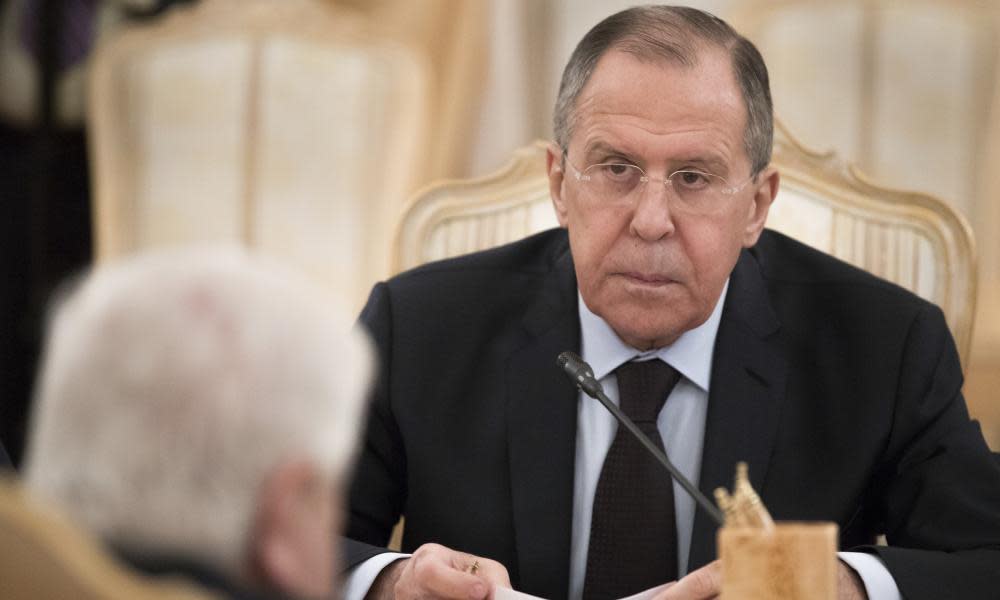Russian and western dispute over Syria chemical attack further muddies truth

An increasingly bitter dispute between Russia and the west over an inquiry into the recent chemical weapons attack that killed about 80 people in Syria has revealed the extent to which the two sides are unable to agree on basic facts – or even agree a process to ascertain the truth.
The row has also brought into questions of future international support for the Organisation for Prohibition of Chemical Weapons, the internationally respected multilateral body responsible for overseeing control of chemical weapons.
OPCW leadership said Thursday it had found incontrovertible proof that sarin gas or a similar substance had been released, but did not reach a view on responsibility for its deployment.
At the meeting in the Hague the OPCW executive rejected a Russian-led plan for an OPCW investigation to be restarted, prompting Russian foreign minister Sergey Lavrov to claim that the west was not interested in the truth of the incident – only in finding excuses to oust President Bashar al-Assad from power.
The west has blamed the Syrian air force for the attack on Khan Sheikhun area in southern Idlib on 4 April to which Donald Trump responded with cruise missile attacks that led to the destruction of more than 20 Syrian warplanes. It was the most decisive US military intervention since the war began, and raised the question whether America will launch fresh attacks if evidence of further chemical weapons emerges.
Russia, meanwhile, has variously claimed that Syrian opposition fighters may have mounted a false flag operation, and that Syrian air force bombed opposition targets where munitions filled with poisonous substances were being made.
Following a meeting with the EU foreign affairs chief Federica Mogherini on Monday, Lavrov again called for the OPCW to send its experts to Khan Sheikhoun and the Shayrat airfield to look into the alleged chemical incident.
The Russian move was rejected by 21 to 6 with 13 abstentions, as countries such as the UK said the existing impartial assessment should not be undermined, adding on the ground assessments could occur but only if the security position allowed.
Russian media reported this position as a decision to block on-site assessments.
In the past, shots have been fired at OPCW expert assessors operating in Syria, and the OPCW say it is currently impossible to guarantee the safety of experts if they personally visited the site of the attack. The Syrian air force has offered to suspend attacks in the region to allow the inquiry to go ahead.
The OPCW insists the samples gathered from the attack site both from those killed and from victims in Turkish hospitals are genuine.
The French government has also said it will produce evidence, believed to be intelligence intercepts of phone calls, that the attack was mounted by Syrian air force planes, and could not have been a false flag operation.
The OPCW has in the past avoided politics and operated through consensus, but such neutrality has been challenged in Syria.
Lavrov condemned the “complete incompetence” on the part of his western colleagues, who he said were “prohibiting the OPCW from sending their experts to the site of the incident, as well as to the airfield from where aircraft loaded with chemical weapons allegedly flew out”.
Lavrov said both the OPCW fact-checking missions tasked with looking into the Idlib incident are being headed by UK citizens, which Lavrov called “a very strange coincidence” that “runs contrary to the principles of an international organization”.
Director general of the OPCW Ahmet Üzümcü responded by saying that he had full confidence in the professionalism and impartiality of his investigators.
In a statement, Üzümcü said that samples had been collected from three dead victims and seven survivors and had been analysed at OPCW-designated laboratories. The results of the analysis indicate that the victims were exposed to sarin or a sarin-like substance.
The OPCW refused to identify the hospitals from which the samples had been taken, but one of the laboratories to which the samples had been taken is understood to be the UK’s Porton Down, one of the world’s leading analysts of chemical weaponry.
Russia has also questioned how members of the White Helmets, civilian rescue mission, were able to operate in the area so soon after the attack.
But Dr Alistair Hay, professor of environmental technology at the University of Leeds, said, “It is quite possible the concentrations of sarin would have dispersed by the time White Helmets arrived. But sarin adheres to a lot of different material and it should be possible to gather evidence in soil or clothing.”
On Monday, the US issued sanctions against 271 people linked to the Syrian agency responsible for producing non-conventional weapons.
The sanctions target employees of Syria’s Scientific Studies and Research Center, which the US claims partly enables the use of chemical weapons.

 Yahoo News
Yahoo News 
